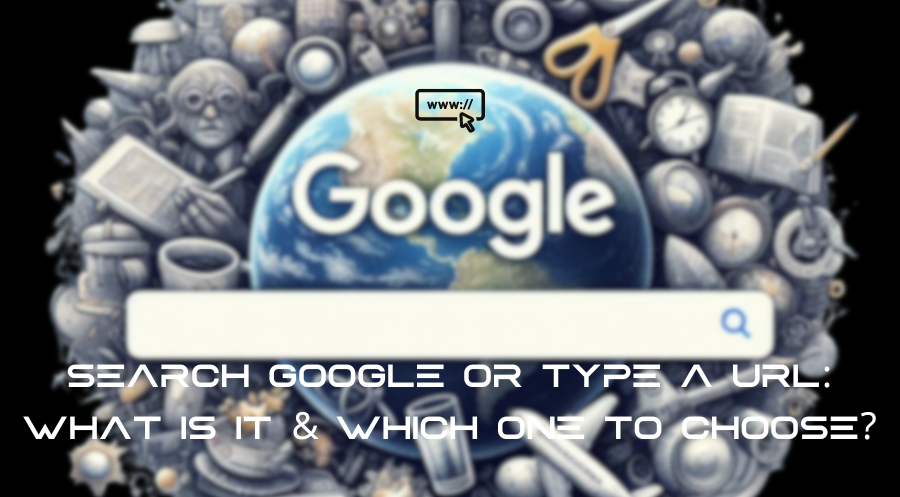Introduction
Search Google or Type a URL: In the digital age, accessing information on the internet has become an integral part of our daily lives. Whether it’s seeking answers to questions, browsing for entertainment, or conducting research, the gateway to the vast realm of online content is typically through either search engines or URLs. But what exactly are they, and which option should you choose? Let’s delve into the nuances of search engines versus typing URLs directly to find out.

Understanding Search Engines
Search engines are sophisticated algorithms designed to scour the internet for relevant content based on user queries. They analyze billions of web pages, indexing and ranking them according to various factors such as relevance, authority, and user engagement. Examples include Google, Bing, and Yahoo. By simply entering keywords or phrases into a search bar, users can access a plethora of information within seconds.
Types of URLs
Uniform Resource Locators (URLs) serve as addresses for specific web resources, allowing users to access websites, files, or other resources on the internet. There are different types of URLs, including HTTP, HTTPS, FTP, and more. URLs play a crucial role in navigating the vast landscape of the World Wide Web, providing a structured way to locate and access content.
Read Also:- A Word on Hyperlinks: Navigating the Web with Ease
Search Google
Google, the most popular search engine globally, offers a user-friendly interface and powerful search capabilities. With features like autocomplete, suggestions, and personalized results, Google aims to provide users with the most relevant and useful information quickly. However, reliance on algorithms means search results may not always align with user expectations or intentions.
Type a URL
Alternatively, users can bypass search engines altogether by typing a URL directly into the address bar of their web browser. This method offers a more direct route to specific websites or resources, bypassing the need to sift through search results. However, it requires users to know the exact URL or have it readily available, which may not always be the case.

Comparison
When deciding between using a search engine or typing a URL, it’s essential to consider factors such as user experience, speed, efficiency, accessibility, security, and personalization. While search engines offer convenience and a vast array of content, typing URLs directly provides a more direct and controlled browsing experience.
User Experience
The user experience varies between search engines and typing URLs directly. Search engines offer intuitive interfaces and helpful features like autocomplete and suggestions. In contrast, typing URLs provides a straightforward and predictable user experience but requires users to know the exact URL.
Speed and Efficiency
In terms of speed and efficiency, typing a URL directly is often faster since it bypasses the need to search and select from multiple results. However, search engines excel in providing relevant information quickly, especially for complex or obscure queries.
Accessibility
Accessibility is an important consideration, with search engines being more accessible to novice users who may not know specific URLs. However, typing URLs directly can be more accessible for users with disabilities who rely on screen readers or specialized browsing techniques.
Security
Security is another crucial factor, with search engines offering encrypted connections and protection against malicious websites. Typing URLs directly eliminates the risk of clicking on potentially harmful search results but requires users to be vigilant about entering legitimate URLs.

Personalization
Search engines offer personalized results based on user behavior and preferences, enhancing the overall browsing experience. However, typing URLs directly provides a more controlled and private browsing experience, devoid of personalized recommendations.
Conclusion
In conclusion, the choice between using a search engine or typing a URL depends on various factors, including user preferences, specific needs, and browsing habits. While search engines offer convenience and accessibility, typing URLs directly provides a more direct and controlled browsing experience. Ultimately, the decision boils down to individual preferences and the nature of the task at hand.
FAQs
- Which is faster: using a search engine or typing a URL directly?
- Typing a URL directly is generally faster since it bypasses the need to sift through search results.
- Are there any security risks associated with using search engines?
- While search engines strive to provide secure browsing experiences, there is always a risk of clicking on malicious search results. Typing URLs directly can mitigate this risk.
- Can search engines be personalized to my preferences?
- Yes, search engines use algorithms to personalize search results based on user behavior and preferences.
- Is it possible to bookmark search results for future reference?
- Yes, most web browsers allow users to bookmark search results or specific web pages for easy access later.
- Which option is more suitable for users with disabilities?
- It depends on the specific needs of the user. Search engines may be more accessible for some users, while typing URLs directly may be preferable for others.

